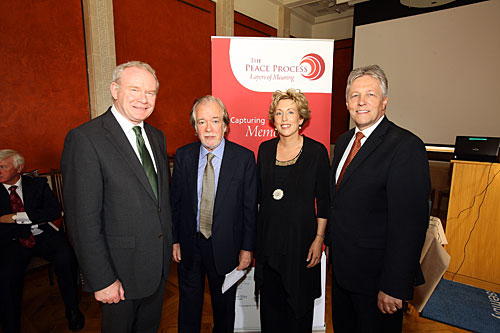Online Directory Uncovers the Unheard Voices of the Peace Process
Posted on: 01 July 2011
An extensive online directory of interviews relating to the Peace Process in Northern Ireland was recently launched by the First and deputy First Ministers, Peter Robinson and Martin McGuinness, recently. The compilation of the LOMOND directory was an inter-institutional project by researchers at Trinity College Dublin in association with Queen Mary, University of London and Dundalk Institute of Technology.
Research Lecturer at TCD’s Centre for Contemporary Irish History, Dr Anna Bryson said: “We are recording key witnesses to the most traumatic and significant events in Anglo-Irish history. This is urgent and important work because many of these people are old and frail. It would be a major loss to our national heritage if their voices were not to be heard.”

Pictured at the launch were Mr Martin McGuinness, Professor Seán McConville, Dr Anna Bryson, Mr Peter Robinson.
Developed by the ‘Peace Process: Layers of Meaning’ as part of a €1.1m three year initiative, the project has two main components, the first of which is the collection of 100 interviews with key figures in peace and reconciliation over the past 40 years or more. The project aims to capture the voices from every strata of society who can speak authentically about the challenges of the past by engaging those who were involved in culture, health, education and community relations at various levels. The LOMOND online directory will draw together much of the valuable work that has gone before and is intended as a first port of call for citizens, academics, policy makers, journalists and anyone with an interest in the conflict in Northern Ireland and its resolution.
The second part of the ‘Peace Process: Layers of Meaning’ work is to train and equip local people in border areas to collect their own stories about conflict and peace. Three pilot projects will be set up and the research team will ensure that all work is conducted in an ethical, legal and technically efficient manner. Dr Bryson, who stressed the importance of carrying out the work with a sense of responsibility to future generations, said: “Numerous acts of peace have been discreet and obscure and many fears and doubts are unspoken. These important recollections, voices and testimonies will be preserved for future generations. The cessation of widespread violence does not mean that a society is at peace – building for tomorrow means acknowledging the very real and deep seated fears that exist today.”
The project, which was funded by the European Union’s PEACE III Programme, will ultimately create a hugely powerful resource for future generations and the interviews conducted will include stories of personal discovery and transformation.
